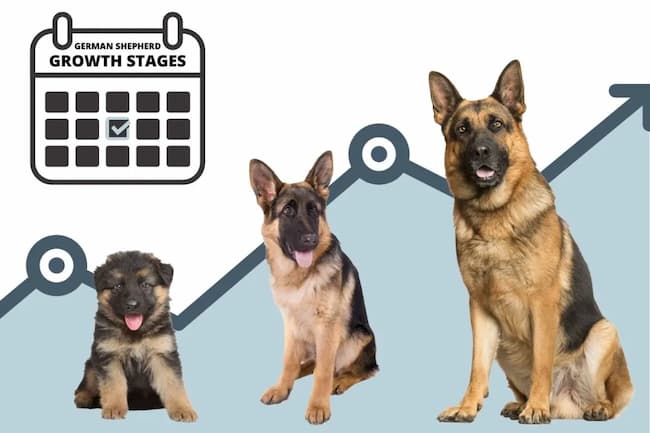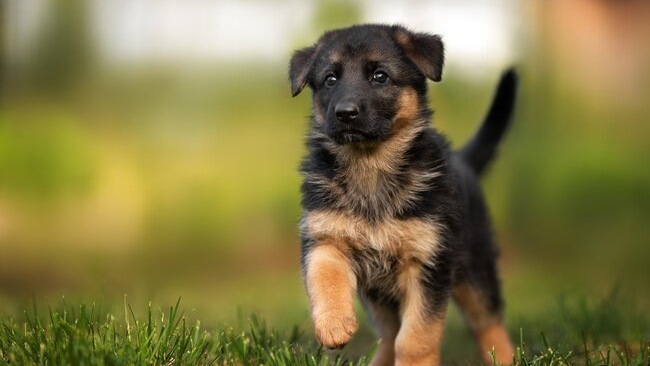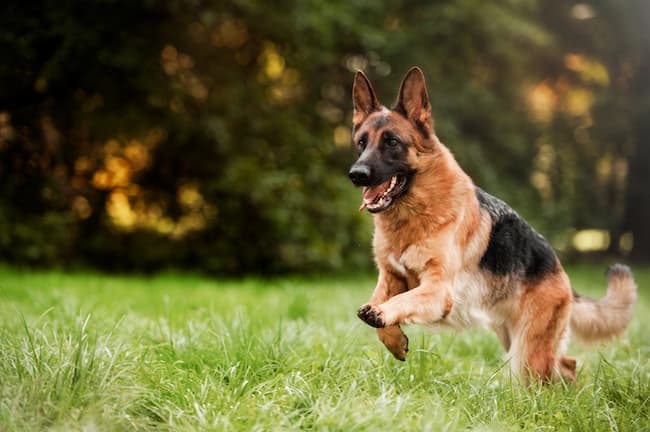Do you want to learn about German Shepherd growth stages? You came to the right place. Adopting a German Shepherd is a big responsibility, as this breed goes through many growth stages that require careful attention and care. From birth to adulthood, German Shepherds develop at a rapid pace, and understanding their growth stages is crucial for their health and well-being.

In this blog post, we will take a deep dive into the world of German Shepherd growth stages, examining the changes that occur during each stage, and providing tips on how to take care of your furry friend at each step of the way. Whether you are a new dog owner or a seasoned pro, this guide will provide you with the knowledge and insight you need about German Shepherd stages of growth to raise a healthy and happy German Shepherd.
German Shepherd Growth Stages
A German Shepherd is considered a puppy until they are one year old, and by that time, it should be fully grown and have reached adult size. The first six months of a German Shepherd’s life are the most important.
During this time, their body is developing rapidly and they should be given proper nutrition and plenty of rest. Puppies need to be socialized and exposed to as many different environments and people as possible. They should also receive plenty of exercise to keep them healthy and active.
At one year old, a German Shepherd is considered an adult. At this age, they should be getting one to two hours of exercise a day and should be fed a diet high in protein. Regular vet visits should be scheduled to monitor their health and check for any potential issues. Proper care during their adult years will ensure they stay healthy and happy.
Puppyhood
The puppyhood stage for German Shepherds is a critical period of development that sets the foundation for the life of the dog. During this time, the pup will learn how to interact with people and other animals, as well as how to behave in different situations.
This process begins when the puppy is no more than a few weeks old, and it lasts until the pup is out of the juvenile stage and into adulthood. During this time, the pup will grow rapidly, both physically and mentally, and it is important for the pup to receive the proper nutrition, socialization, and training in order to ensure healthy growth.

The first few weeks of a German Shepherd’s life are especially important, and it is during this time that the pup will begin to bond with its human family. This is also the time when the pup will start to explore its environment and learn basic commands.
As the pup grows, it is important to ensure that it receives proper nutrition in order to support its rapid growth. During this stage, the pup should be fed a high-quality, age-appropriate diet that contains a balanced mix of proteins, fats, carbohydrates, vitamins, and minerals.
This will help to ensure that the pup’s bones and muscles develop properly and that the pup has enough energy to explore its environment and learn. It is also important to provide the pup with plenty of exercises and mental stimulation during this time to help promote physical and mental growth. Know why do German Shepherds have sloped backs.
Juvenile Phase (3-6 Months)
The juvenile stage of German Shepherds is between 3-6 months and is a critical period of German Shepherd growth stages and development. At this age, they should be transitioning from a diet of puppy food to adult food and should be learning basic commands, socializing with other animals, and starting to understand house rules.
During this phase of German Shepherd growth stages, the dogs will grow rapidly, their bones and muscles developing, and their coat and color will continue to develop. Their mental and emotional development is also critical, as it will shape their behavior and temperament for years to come.

Good care and nutrition during this time are important for proper development, and German Shepherds should have access to plenty of nourishing food and clean water. Exercise is also important, and owners should make sure their pup is getting plenty of time to run and play, as well as the opportunity to explore and socialize with other animals.
During this stage, owners should also start training their pups, teaching them basic commands, and positively reinforcing good behavior. It is during this stage that owners will start to see the breed’s true potential emerge, and with proper care and training, German Shepherds can reach their full potential and provide years of loyal companionship.
Adolescence Phase (6-18 Months)
The Adolescence Phase of the German Shepherd growth stages is an important period in the life of this breed of dog. This phase usually starts at 6 months old and generally lasts until 18 months. During this time, German Shepherds experience rapid changes in both physical and psychological development.
Physically, they will grow quickly, and their bones and muscles will become stronger and more defined. It is also during this phase that their coat will change from a soft and fuzzy puppy coat to the harder and coarser coat of adulthood.

In terms of psychological development, German Shepherds become more independent during this stage. They will become more dominant and assertive, and will often challenge their owners’ authority. This is a normal part of this breed’s maturation process and is necessary for them to become well-adjusted adults.
This is also the time when German Shepherds learn important socialization skills, such as interacting with humans and other dogs. It is important to provide them with ample opportunities to learn and practice these skills during this stage.
Finally, it is important for owners to provide their German Shepherd with plenty of exercises and mental stimulation during this stage. It is also important to provide them with plenty of love and affection during this period, as this will help to ensure that they grow into a stable and well-rounded adult.
Adulthood Phase (24 months+)
The Adulthood phase (24 months+) is the final phase of a German Shepherd’s growth cycle. At this stage, the German Shepherd is considered an adult and has reached full physical and mental maturity. This phase typically lasts for about two to three years and is characterized by the dog’s physical maturation and socialization.
During this time, the German Shepherd’s coat will become denser and will have a fuller color. You can learn how to improve German Shepherd coat even more. The dog’s weight will have stabilized and muscle tone and body structure will be fully developed. The German Shepherd’s agility, speed, and strength will be at their peak, and the dog will have the potential to be a formidable working or protection dog.

Socialization will also help to ensure that the dog is comfortable around humans and other animals, as well as its surroundings. Mental stimulation and physical exercise will also be important during this phase, as these will help to keep the dog’s mind and body active and healthy.
The Adulthood phase is a crucial part of a German Shepherd’s growth cycle, and it is important for owners to ensure that their dogs receive the proper nutrition and exercise during this stage to ensure that the dog can reach its full potential. With the right care and attention, the German Shepherd can be a loyal and loving companion for years to come.
Seniority Phase
The seniority phase is the fourth and final stage of German Shepherd growth stages. This stage is characterized by increased maturity and stability, both mentally and physically. Dogs in this stage are typically between 2 and 4 years old and have reached their full growth potential.
During this time, their physical body will become more refined and muscular, and their bones and joints become stronger and denser. They become easier to train and have better control over their impulses, making them easier to manage.

It is also during this stage that their personalities become more evident, and they can become less reactive to environmental changes. At this stage, it is important to provide your German Shepherd with plenty of exercises and mental stimulation to keep them healthy and content.
They will need plenty of outdoor time to explore and play, as well as regular opportunities for socialization with other humans and dogs. Nutrition is also important to maintain their good health, and providing them with a balanced diet will help them reach optimal levels of energy and activity.
Overall, the seniority phase of a German Shepherd’s life is a time of growth and refinement. Proper nutrition, exercise, and training are essential elements to help your German Shepherd reach their peak health and happiness.
Final Words
We have given an in-detailed guide on German Shepherd growth stages. German Shepherds are lovely dogs and deserve all the love and care. With proper care and attention, they can reach their full potential, both mentally and physically. We hope you like this guide. Keep visiting German Shepherdss website for more useful and informative articles.
